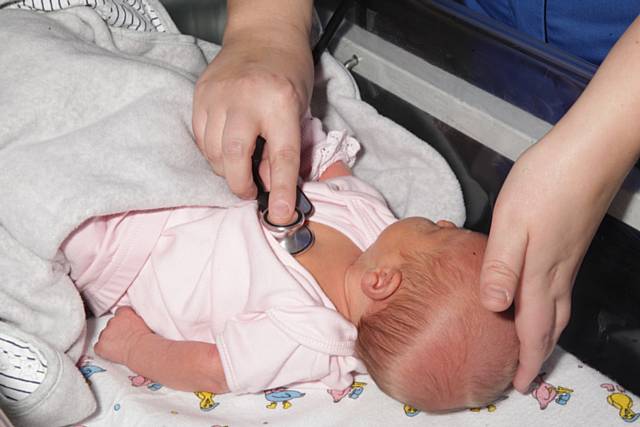New equipment and IT systems rolled out as part of Maternity Services Improvement Plan
Date published: 29 December 2016
The Pennine Acute Hospitals NHS Trust, which runs maternity units at The Royal Oldham Hospital and North Manchester General, is spending £340,000 on new electronic fetal monitoring equipment as part of its Improvement Plan for supporting staff across its maternity services.
The new equipment is being installed into the labour wards and obstetric theatres across the two hospitals where over 9,000 babies are born each year and will be in place and operational by February 2017.
Currently staff use monitors at the bedside and a paper recording of the baby’s heart rate trace, however, the K2 system provides a central electronic monitoring and archiving solution for the fetal heart during labour.
This equipment will improve patient care by having an electronic recording at the bedside, and it can also be used remotely and reviewed by other doctors and midwives, so that advice and support can be given if required.
When using the new equipment the heart rate trace is electronically archived, replacing the need for making paper based notes during labour. Extensive training will be given to staff.
The new equipment has been purchased as part of a wider programme of improving outcomes and improving safety for women and children.
Deborah Carter, Divisional Director for the Women and Children’s Division at the Trust, said: “Misinterpretation of the fetal heart rate trace (CTG) is a common feature in labour care throughout the world. The aim of switching to a new electronic e-CTG monitoring and archiving system is to reduce harm by making it easier for staff to interpret CTGs using an approved electronic system. This will lead to appropriate and timely intervention by our doctors and midwives where necessary.”
In addition to the fetal monitoring equipment the Trust has also rolled out a new computerised system called the Antenatal Paediatric Alert system which was developed by the Trust. This system promotes appropriate sharing of information between midwives, obstetricians and paediatric staff at The Royal Oldham Hospital and Rochdale Infirmary.
Staff have enthusiastically embraced the new system, introduced a few months ago, which allows midwives and obstetricians to send alerts to staff in the paediatric and neonatology teams about information that may affect the care of the unborn child. The alert is used to document a postnatal care plan on the mother’s electronic notes where it can be accessed by all clinicians who need to see this information. A ‘live’ report also lists all women who have had an alert sent, and their up to date plan of care, for staff working on the labour ward, birthing centre and post natal ward at the Royal Oldham Hospital.
Over the first two months of using the system there has been a 34% increase in data quality over the previous paper based system, and the number of alerts sent has more than doubled compared to the two months before its introduction.
The system will be extended to the maternity departments at North Manchester General Hospital and Fairfield General Hospital in January.
Dr Iram Siddiqui, Consultant Obstetrician at The Pennine Acute Hospitals NHS Trust said: “When a high risk pregnancy is identified requiring neonatal input an alert is generated to involve the neonatal team in the care of the pregnant woman. We set out to create an electronic, pass-word protected, neonatal alert system which could be accessed by authorised individuals, anytime and anywhere in the Trust. This has enabled the fetal medicine team, obstetricians and the neonatal team to access this information 24/7, especially out of hours and be able to safely institute planned investigations and treatment for the new-born baby in a timely manner.
“The system has the added advantage of providing multidisciplinary team members with an opportunity for enhanced care education and learning when expertise is shared between providers at the monthly MDT meetings. The system also records all the neonatal outcomes which is a valuable audit tool to ensure our practice is in line with national standards.”
Georges Ng Man Kwong, Consultant Chest Physician and Chief Clinical Information Officer at The Pennine Acute Hospitals NHS Trust said: “This clinical solution was developed in partnership with the Trust’s IT department in response to real clinical needs identified by our clinical teams. As a multi-disciplinary team they have concentrated on providing a safe and practical solution to improve patient care and safety documentation. The willingness of our clinical staff working collaboratively in a new way and contributing their valuable time to problem solving has enabled the forms project to be quality assured and successfully implemented within a relatively short period of time.”
In September 2016 the Trust introduced an Improvement Plan that aims to improve fragile services, including maternity services, by stabilising and supporting the workforce and ensuring all staff across the Trust’s maternity services are fully engaged, trained and developed specific to their job roles. More midwives are being recruited to ensure staffing levels are in place and adequate to meet demand. The investment in staff, new equipment and systems described here will help the Trust in its journey to improve its maternity care.
Do you have a story for us?
Let us know by emailing news@rochdaleonline.co.uk
All contact will be treated in confidence.
Most Viewed News Stories
- 1Sports club music festival to go ahead despite neighbours’ fears
- 2Council tax rise planned for the Rochdale borough - have your say on budget cuts
- 3How life has changed on a notorious, crime-ridden estate shut off to outsiders
- 4Castleton station ‘to become epicentre of huge change and growth’
- 5Roadworks, temporary road closures and restrictions
To contact the Rochdale Online news desk, email news@rochdaleonline.co.uk or visit our news submission page.
To get the latest news on your desktop or mobile, follow Rochdale Online on Twitter and Facebook.


